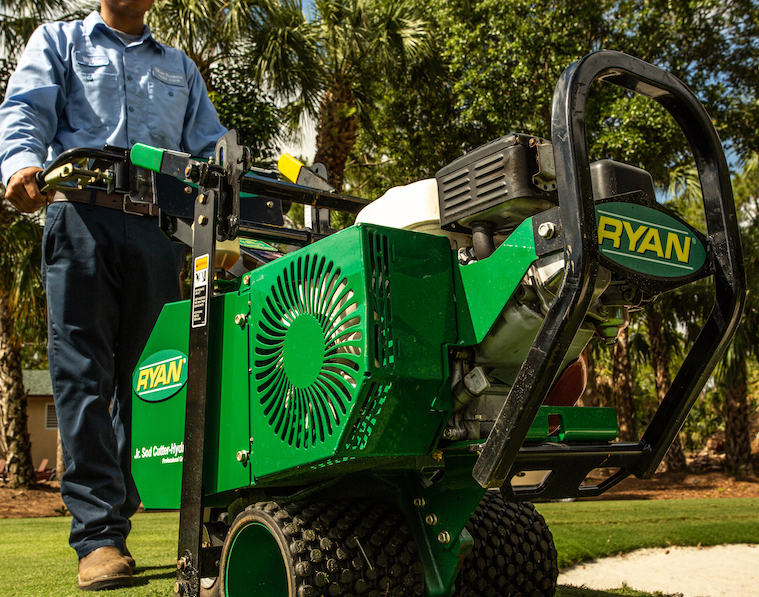Take Care of What Matters

By Matt Shaffer
As a landscape industry professional, the “product” you deliver to your customers is the quality of the landscape. That’s the fruit of your labor, and the foundation of your reputation. And, of course, a key factor in building that foundation is having good equipment and taking care of it. If we look at what goes into maintaining your equipment, it reveals a lot more about your company’s culture than you might think. As John Wooden said, “Success is a by-product of preparation.” It turns out that good equipment practices are the result of having the right priorities and values.
If you can, hire an equipment manager or mechanic
This doesn’t make sense for all businesses, especially if you’re a smaller lawn care company, but having a mechanic that you can trust with your equipment will pay for itself twice over. Ideally, your mechanic will also be able to step in and do other work like mowing or plowing, but their main responsibility is to keep your equipment running smoothly. They’ll be responsible for checking oil, filters, hydraulics, blades, belts, and making routine repairs so you aren’t blindsided by major breakdowns that turn into downtime.
Use quality parts and fuel
If a deal on parts is too good to be true, it probably is. It’s absolutely worth the investment to get good-quality parts. You’ll save money in the long run because your equipment will run better and last longer, minimizing repairs. This goes for fuel and oil, too.
Have a depreciation schedule for your next purchase
Many will say that it’s cheaper to repair equipment than to buy new stuff. That may be true, but there are two flaws in that logic. One, you need to factor in the value of reliability and the cost of downtime. If a machine is constantly in and out of repairs, it’s going to take a toll on your schedule, your team, and your bottom line. Occasional minor repairs shouldn’t make you overreact, but the more frequent and expensive your repairs get, it might be time to invest in new equipment.
The other thing you should consider is the resale or trade-in value of your equipment. If you take care of it, you might be able to trade in and use that money to get a more advanced piece of equipment.
You can keep track of all of this by creating a schedule that plans out your equipment trade-ins and how you’ll be able to budget for them. Some products, like string trimmers and chain saws don’t really hold any value later on in their life and therefore won’t have a big return on trade-ins.
Treat your employees well and they’ll treat the equipment well
Let’s go a little bit deeper with this. If you’re a manager who makes decisions on equipment, in many cases you’ve got a team that runs the equipment, probably more often than you do. Perhaps the most important way to care for your equipment is to care for the people who use it.
First of all, pay them what they deserve. If you have a good team, you want to hang on to them and make sure they don’t go looking for another opportunity. You also want them to be motivated and proud of their work and their position. By paying them well, you’re empowering them to do their best.
Next, train them on the equipment. I’ve seen so many times that a machine gets added stress on it because an operator doesn’t know how to use it. If they’re operating it appropriately, you can extend the life of the equipment and improve the finished product.
Leave margin in your business for maintenance
In a growing business and a booming industry, it’s easy to say “yes” to new business. After all, isn’t new business always a good thing? Well, not necessarily. In order to keep a stable day-to-day operation, you need to be careful of adding to the workload. If you get overloaded trying to meet customer expectations, it’s easy for regular maintenance to go out the window. Your to-do list for your clients gets longer, and something has to give.
That’s why it’s essential — from a business perspective — to be discerning, and to sometimes say “no” if a project isn’t doable. Also, don’t just squeeze someone in to make them happy. Customer satisfaction is important, but don’t compromise on your time just to add a bit to the bottom line. Oftentimes, when you undercut yourself, you risk hurting your whole operation. Of course, in some cases, the solution is to add to your staff, but then you need to train them properly to keep the operation running smoothly.
The value of equipment care, therefore, runs deeper. If you take care of your equipment, it probably means that you’re taking care of your employees, and they’re much more important than any mower, truck or plow.
Matt Shaffer is a world-renowned golf course superintendent and turf expert. He has worked at some of the most prestigious golf courses in the world, and now owns his own business called M.A.T. (Minimalist Agronomic Techniques) where he promotes his philosophy of “less is more” when it comes to turf maintenance. He is currently working with the Ryan and Steiner brands on “Mondays with Matt,” a social media video series, sharing tips and stories from his experience in the turf industry.


